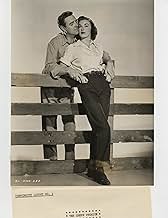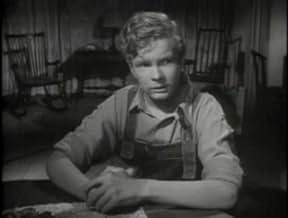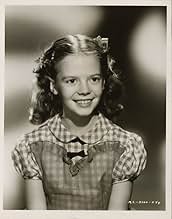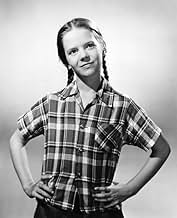Ajouter une intrigue dans votre langueAfter the Matthews family buys a farm, the father suffers a severe injury, which puts his four children in charge. Daughter Deborah and her kid sister Susan take the lead--with help from the... Tout lireAfter the Matthews family buys a farm, the father suffers a severe injury, which puts his four children in charge. Daughter Deborah and her kid sister Susan take the lead--with help from the handsome local agricultural agent.After the Matthews family buys a farm, the father suffers a severe injury, which puts his four children in charge. Daughter Deborah and her kid sister Susan take the lead--with help from the handsome local agricultural agent.
- Réalisation
- Scénario
- Casting principal
- Récompenses
- 1 victoire au total
- Jessie Wexford
- (as Jeanne La Duke)
- Dr. Pomeroy
- (non crédité)
- Joe
- (non crédité)
- Land Owner with Loggers
- (non crédité)
- Mr. Clairborne
- (non crédité)
- Mr. Grinstedt
- (non crédité)
Avis à la une
Despite the warm family overtones, the script is far from sappy. Catch how Dad (Brennan) manipulates the family's democratic process. He wants the image of democratic equality at the same time he works it for his own advantage. There's a larger lesson here that remains topical for our own time. Also, note how Dad opts for short-term financial advantage over longer-term conservation by cutting down the hillside trees. Those roots provide long-term flood protection, but don't provide the immediate cash he needs. Thus, his motives are understandable, yet when rain comes, calamity results. We continue to be confronted by the environmental issue of short-term advantage versus long-term security; at the same time, the screenplay raises this concern long before its like became a national issue.
The values here may be conservative, but they're hardly hidebound. Catch Rev. Benton's (Stone) Sunday morning sermon. It's really a recognition of the importance of science as both a source of knowledge and a potential benefit to our lives. The message is also a long way from the type of dogmatic conservatism that sees the Bible as the last word on either worldly wisdom or natural history. Then too, the values of 4H and the family farm are as relevant now as they were then, perhaps more so now that the hard lessons of industrial farming have entered our food supply. My general point is that the movie may be dated in some ways, but the screenplay remains an intelligent one even 60 years later.
Unfortunately, the version I last saw (on TMC) was edited and failed to include the now notorious bridge scene referred to by other reviewers. It also failed to include at least one other important scene I recall from an earlier version. So viewers should be alert to edited versions. Nonetheless, the movie is generally under-rated and combines both solid entertainment values with a well thought out message that makes for very worthwhile viewing.
Walter Brennan plays a serious version of his later Grandpappy Amos McCoy role. He's the father of four children, the grownup Marguerite Chapman and youngsters Ted Donaldson, Connie Marshall and the youngest Natalie Wood. Brennan is old fashioned and stubborn and not willing to listen to advice about new agricultural methods. Especially when they come from smart alecky young county agent Robert Paige. Paige knows his stuff, but he's a bit too sure of himself to suit Brennan and Chapman in the romance department. Of course she comes around in every way.
The star here is young Natalie Wood and she plays the part like a young Margaret O'Brien. In fact when I tuned the film on I wasn't sure I wasn't watching Margaret O'Brien, the only clue that puzzled me was that Ted Donaldson was too old be an older brother for O'Brien. Young Natalie is sweet and engaging and I defy anyone not to empathize with her concern for her young black lambs whom she is raising as her 4-H project.
The kids from 4-H pitch in with helping hands (that is one of the four Hs after all) to save the farm from the elements and the stupidity of man which I won't go into. All in all they're wholesome All American kids and a real advertisement for the group.
And The Green Promise is also an advertisement for the 4-H clubs in the USA. It's a nice family film without great production values and Natalie Wood is exceptional.
Mr. Matthews (Walter Brennan) and his children arrive in town and they buy a farm. One of their neighbors is David Barkley (Robert Paige) and he's a college educated agricultural agent. But Matthews is a stubborn old guy and refuses to listen to Barkley--choosing to use his old tried and true methods. Likewise, he doesn't listen to his children but dominates them. He pretends everyone in the family gets a say but uses emotional blackmail to get his way every time. When Matthews is badly hurt and his children have to run the farm, the oldest, Deborah (Marguerite Chapman) decides to loosen up the reins and try new methods. When her father eventually learns of this, he tries to sabotage her efforts--all to prove he was right after all.
One of the beneficiaries of Dad's injury is little Susan (Natalie Wood). She's wanted to raise lambs and join 4-H but he vetoed this because...well...because he could! Now with Dad laid up in bed, Susan tries to prove she can raise sheep on her own.
Fortunately, everything works out by the end of the film....and I stopped hating Matthews! It is a nice little film...just try to ignore Matthews' boorishness that occasionally rears its ugly head. Also, try to ignore the kid in the Aunt Jemima costume at the party! My how times have changed!
Le saviez-vous
- AnecdotesThere is one scene where a young Natalie Wood is supposed to run across a bridge. She was told that the bridge would collapse after she got to the other side, but there was an accident and the bridge collapsed while she was still on it. She broke her wrist and it never healed properly. She always wore a bracelet to hide the lump left behind.
- GaffesWhen Susan is running home from school and encounters a bull, a moving shadow of a crew member is visible on the ground, lower left of the frame.
- Citations
Reverend Jim Benton: The really sinful man or woman is the one who, through bigotry and ignorant pride, refuses to learn, and calling his ignorance virtue tries by self-made rule and by scorn to keep all others from learning. These are the real sinners. And here is the vilest evil: to feed their ego, to disguise their inadequacies, to hide their quaking fears, they sneer at the new, revile the experimenter and deride the pioneer and then, hypocritically, defend their actions behind the fog-bound fortress of intolerance.
- ConnexionsFeatured in Trop jeune pour mourir: Natalie Wood - Die Macht der Prophezeiung (2014)
Meilleurs choix
- How long is The Green Promise?Alimenté par Alexa
Détails
- Durée
- 1h 33min(93 min)
- Couleur
- Rapport de forme
- 1.33 : 1























